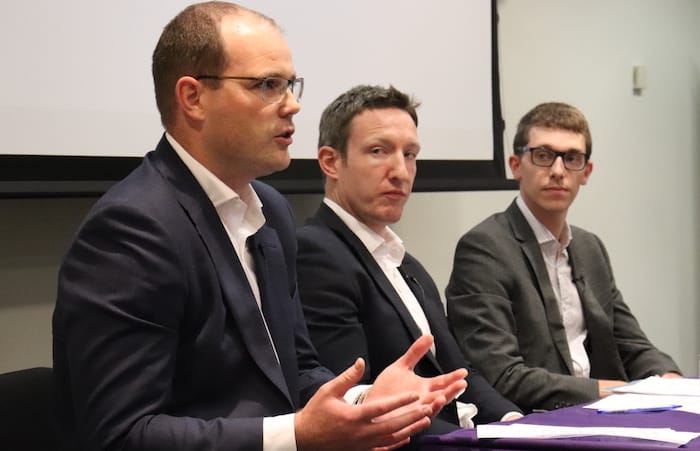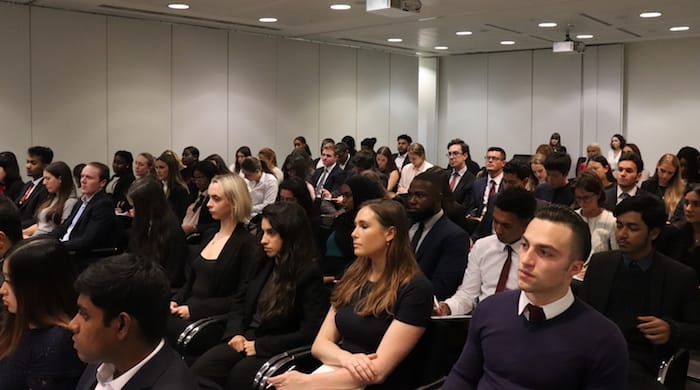RPC insurance specialists deliver insights on hot commercial awareness topic

At Legal Cheek’s student event last month, ‘Insurtech, the law and new opportunities for future lawyers’ with RPC, lawyers from the firm’s insurance group gathered together to share their insights on one of the hot commercial awareness topics of 2018. Here are six things you need to know.
1. The conservative industry of insurance is reconciling itself with innovation and insurtech
Insurance is big business and big business needs processes. Add onto that heavy regulation and legacy systems across global offices (and different systems from acquired businesses) and it is easy to understand the challenges insurers face with implementing new technology solutions. Technology is undoubtedly changing the way people think about and interact with insurers though, whether that is through the use of comparison websites or because start-ups such as Lemonade are building challenger propositions.
There’s still some distance to travel before we see anything resembling industry-wide disruption, said RPC’s global head of insurance Simon Laird. Only this year has Lloyd’s of London started requiring its insurers to write their risks electronically using electronic placement rather than ink stamps, said George Barratt, a newly qualified associate in the professional and financial risks team. He continued:
“You would think that’s how it’s done at a big organisation such as Lloyd’s, but the uptake of doing it this way has been extremely slow. They’ve set some quite modest targets and they’re struggling to meet them.”
Understanding how new technology will affect your client's business is key, says RPC associate George Barratt
Posted by Legal Cheek on Tuesday, 30 October 2018
In the meantime, the incumbent market retains the know-how and expertise to write new and interesting risks, like Richard Branson’s Virgin Galactic Spaceship. There is no existing algorithm for that type of risk!
2. Self-driving cars — who’s to blame when they crash?
As the insurance industry gears up for the automated vehicle revolution, it is presented with a number of interesting legal questions. On hand to answer a few of the myriad challenges the technology presents was Daniel Guilfoyle, a senior associate in RPC’s insurance team based in Bristol. Legislation and regulations relating to automated technology have been redefined through the Automated and Electric Vehicles Act 2018. Interestingly, it is the driverless car that is insured, and not the driver. “We’re starting to look at motor insurance as a product liability package,” said Guilfoyle.
In the event of an accident, it becomes difficult to ascertain where fault lies. If a car driven in a completely automated state causes an accident then the presumption will be that the car itself and its technology are at fault. However, given the technology involved with automated vehicles, it is likely that various components will be manufactured by different companies. So while the insurers for the main manufacturer of the vehicle might incur primary liability, it may well look to recover that liability from the manufacturer of the component that is considered to be responsible, explained Guilfoyle. “That’s when we might see product liability insurance policies interacting” he said.
On a moral level, it will be interesting to see how the tech determines what decision to make when confronted with protecting the driver at the cost of third parties. “That’s the real question posed by autonomous vehicles,” said Guilfoyle.
Self-driving cars will be held liable for damage that they cause, says RPC Senior Associate Daniel Guilfoyle
Posted by Legal Cheek on Wednesday, 31 October 2018
3. Insurance lawyers are becoming more entrepreneurial
We’ve seen a number of major data and privacy scandals in recent months. At our event, we learnt that RPC has developed a service to help companies deal with data breaches. It’s called ReSecure. How does it work? A company suffering a data breach can ring ReSecure’s 24-hour hotline service to obtain access to a combined team offering data breach management, technical forensic investigation, legal advice as well as public relations services. The service has seen a notable upturn in the last 12 months partly due to the GDPR, said ReSecure team member Guilfoyle.
Looking ahead, Guilfoyle expects law firms to spend more time thinking “entrepreneurially” to develop new products like this.
4. Technology can help identify cases of insurance fraud
Fraud costs the UK insurance industry billions of pounds each year. Its why technology that goes some way in alleviating this is all the more important. One such example is black box technology. Typically offered as an insurance policy for young or rookie drivers, a ‘black box’ is a small device fitted into a car that monitors the individual’s driving. It can also help identify fraudulent accidents, said Laird.
In another example, Laird told the audience of over 70 students that according to one insurer 14% of people who report their mobile phone as lost or stolen do so from the mobile phone they’re apparently missing! “Fraud costs the insurance industry massively but the tech is there to catch the fraudsters out,” he said.

5. Separating the hype from reality: blockchain in the insurance sector
The financial services industry has been looking at blockchain solutions for a while, yet in a 2018 report by Gartner, that was cited by Laird, it was estimated that 0% of the banking sector’s digital revenue will be generated from blockchain this year. Putting things into perspective, “fintech is probably ten years ahead of the insurance industry” Laird added.
There are, however, some examples of blockchain disrupting the insurance industry. Last year, global insurance provider AXA launched fizzy, an automatic compensation tool for delayed flights that uses blockchain technology. How it works is that a customer, using the fizzy platform, purchases flight delay insurance which is recorded in a blockchain. The smart contract is connected to air traffic databases, and as soon as a delay of more than two hours occurs, compensation is triggered automatically.
Could we see more ventures making use of the technology? Possibly, but there’s still quite a way to go. Fizzy is currently in the test phase and only applies to flights between Paris and the US. There’s a practical challenge, too. In the scenario above, the compensation decision is delegated by AXA to an independent network. “If the customer contracts with the capital provider, the insurance broker is cut out. The commercial reality is such that the insurance broker owns all the relationships and they’re not going to let that go,” said Laird.
RPC's Global Head of Insurance Simon Laird explains why insurance brokers are reluctant to use blockchain technology
Posted by Legal Cheek on Friday, 2 November 2018
6. Insurtech can help countries afflicted by natural disasters
Natural and man-made disasters caused $136 billion (£103 million) of insured losses last year. Insurance companies are being challenged to offer new ways to respond to these disasters. Insurtech and more specifically sensor technology, has made parametric insurance possible. Parametric insurance is an innovative product that responds to a set of specific parameters, for example, a certain magnitude of an earthquake or a specific category of storm and then pays out a fixed sum, foregoing the traditional model of insurance and expediting relief to the client.
Other examples of applying technology to insurance includes analysis of social media, which proved useful during the tragic Grenfell Tower fire, and use of data provided by drones. “Technology helps insurers map out the damage and assess loss quickly — much quicker than a loss adjuster who’ll have to wait until it’s safe to assess the ground,” said Laird.
Find out more about RPC on Twitter and Instagram.
